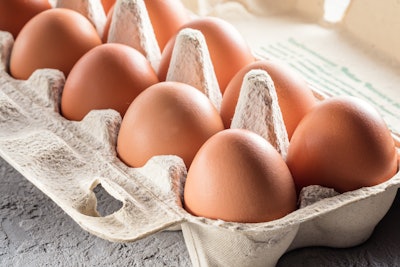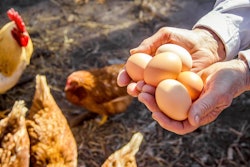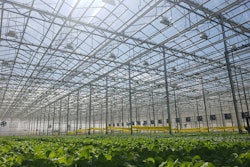
Despite the impact of the COVID-19 pandemic on the egg industry, companies and producers continue to make progress on their commitments to source only eggs from hens that are cage-free by 2026 or sooner, according to Compassion in World Farming’s annual EggTrack report.
According to the 2020 report– the first to expand beyond the US and Europe to include global companies – 134 of 210 (63%) of companies tracked made progress. Of the 210 companies, 80 operate globally, 57 operate only in North America or the United States, and 73 operate only in Europe. The report includes an interactive website that displays the progress of each company compared to its competitors.
“Nearly every major food company is committed to being 100 percent cage-free by 2026, or sooner,” said Rachel Dreskin, US Executive Director, Compassion in World Farming. “The 2020 EggTrack report shows us who’s leading the flock, and who’s falling behind. As we look towards a fully cage-free future we will continue to hold companies accountable, work with them to make progress, and provide support to ensure the right systems are being invested in, and ultimately ensure that meaningful improvements are made for every laying hen whether she lives in the United States, China, or Europe.”
The 2020 EggTrack Report found that:
Five companies made eggcellent progress, including:
- General Mills: increased its global cage-free sourcing from 40% to 55%.
- Danone: increased its global cage-free sourcing from 43% to 88%.
- McDonald’s: increased cage-free sourcing from 33% to 43% in the US.
- Subway: increased cage-free sourcing from 11% to 24% in the US.
- Marriott: reported that 44% of eggs are cage-free globally and 54% of eggs in their US business are cage-free.
While five companies are falling eggregiously behind:
- Burger King: retracted its European cage-free egg commitment and reporting.
- Hardee’s and Carl’s Jr.: used to have a commitment to source 100% cage-free eggs by 2025 but it is no longer public.
- Krispy Kreme Donuts: used to have a commitment to source 100% cage-free eggs by 2026 but it is no longer public.
- The Fresh Market: has missed its commitment deadline and has not reported progress against it.
Demand for cage-free eggs is growing globally:
- Corporate demand for cage-free eggs is no longer limited to European and North American markets. Since 2016 when Compassion first published EggTrack, the number of companies with global cage-free commitments has grown from 5 to more than 37, including global giants like Nestlé, Marriott, Barilla, Kellogg’s, Aldi Sud, and Aldi Nord and brands like, Breyer’s, Hellmann’s, Ben & Jerry’s, Sara Lee, Entenmann’s, and Häagen-Dazs.
In the past five years, nearly every major food company has committed to go 100% cage-free, with the proportion of hens raised in cage-free systems in the US growing from 9.8% in 2016 to 25.1% today. Cage-free eggs come from hens raised in barns, where they have space to turn around and stretch their wings, as well as places to perch, scratch, nest and take dust baths.
By contrast, battery cages where most hens still live only give them space equivalent to the size of a sheet of paper. Caging hens for the purpose of egg production is one of the worst-of-the-worst factory farming practices.
As cage-free markets grow globally, companies and consumers should be aware of “combination” and “limited access” systems, which are marketed by manufacturers as “cage-free” and endorsed by industry groups but have doors which can be easily closed – allowing a producer to switch back to caged production, or more worryingly, during “cage-free” production when an auditor isn’t present.

















